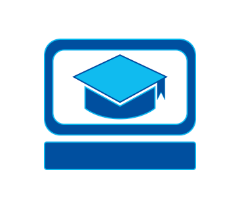Because of the current developments in the spread of the coronavirus, it is currently not possible to foresee how regular university and teaching activities will be affected in the near future. The TIK would like to keep you up to date on tools with which you can digitally support your work or compensate for interruptions. We will also provide information about possible restrictions of our IT services.
Please also follow the
Newsticker: Information on the coronavirus
Current information on IT services
- Open consultation hours
-
We offer open consultation hours on Tuesdays and Thursdays between 1:00 and 2:00 p.m. on all topics related to digital teaching and e-learning (ILIAS, Webex, Conceptboard, recordings, etc). They are held via Webex and are usually run by our eScouts. You can simply join the meetings spontaneously and without registration. English speakers welcome!
- eScouts
-
eScouts are student volunteers who help you with the digitization of courses and their online implementation. They are trained by the TIK and are in close consultation with the e-learning staff of the Digital Teaching Taskforce. eScouts support you with the use of and questions about Webex, ILIAS and lecture recordings as well as Conceptboard. Here you can "request" an eScout for your course.
- Training Sessions
-
Training sessions on Webex and Conceptboard are held every two weeks. Here you will learn, for example, tips and tricks for successfully conducting meetings, how to create breakout groups in Webex, and how to use the Conceptboard digital whiteboard in your courses and meetings. English speakers welcome!
- Helpdesk
-
The Helpdesk (Benutzerberatung) will remain closed until further notice. Support by telephone and e-mail will continue to be available during opening hours.
- Computer pools
-
The student computer pools will remain closed until further notice.
- Telephone support
-
We ask for your understanding if one of the employees cannot be reached directly by telephone. Our central support hotline 685-88000 is still manned and the support of our services via e-mail and remote maintenance will continue. Please find information on our service pages, and send us your request to the designated support address.
- Print & Scan Devices (Service for employees)
- OpenCms Trainings
-
We offer online courses during the Corona period.
If you have any questions please see our user documentation (DE) or contact the OpenCms-Support.
Securely working from home
In principle, employees are encouraged to use existing service equipment for working from home. This is obligatory for employees in the central administration in order to largely guarantee the protection of confidential information. During the current exceptional situation, employees of institutes and central facilities who cannot be provided with a business computer can also use private devices for working from home. The following conditions apply:
-
The operating system and applications are up-to-date in terms of security, and all security updates are installed and active.
-
The end device for working from home is under the sole control of the respective employee of the University of Stuttgart. At least when being used for working from home, the system may not be made accessible to any third party (including family members).
-
When working from home, only those operating system services and applications necessary for work may be active on the end device.
-
An up-to-date virus scanner with up-to-date signatures is installed and active.
-
At least the non-volatile data stored on the system for conducting official business is strongly encrypted.
-
The latest version of the Cisco AnyConnect VPN client is installed for access to the university networks.
We would like to ask you to give special care – especially when handling personal data – when working from home.
- RUS-CERT: Guideline and regulations for securely working from home (DE)
Guideline, regulations, how-tos for admins and employees
Information for employees of the institutes and facilities
Service telephones can be diverted to a private line. The easiest way to do this is at the workplace. Select “Rufumleitung” (call forwarding) on your phone under the “Menu” tab. Select “Sof. Rufuml.” (immediate call forwarding). You will then be prompted to enter the destination phone number.
If you are already working from home or have questions/problems, please contact telephone support.
Please note that only a limited number of calls can be conducted simultaneously. A caller might hear a busy tone although the called party is free ("engaged tone"). In this case, please try again later and keep your call brief.
You can access your e-mail mailbox from any end device at any time via a web browser by logging on to https://mail.uni-stuttgart.de/ with your AC account. If you use a mail client such as Microsoft Outlook or Thunderbird at home, we provide the following set-up instructions (DE).
We offer different services for tele-, web, and video conferencing. The DFNconf service is currently available. Please note that this service is highly frequented because of the current situation and can therefore only be used to a limited extent. We will promptly inform you about alternative possibilities here and on the service page.
Current Information:
Cisco Webex was licensed campus-wide as a scalable meeting platform and is available to all users of the University of Stuttgart with immediate effect.
To access the platform visit: https://unistuttgart.webex.com.
In order to use the service as a conference host, a registration in the platform is currently required. Please write a short, informal request to the Webex support.
No registration or additional authorization is required for conference participants, regardless of whether they are members of the university or an external person.
For a quick introduction to Webex, under the following link you will find instructions for web conferences with Webex (DE).
Please note: The use of a VPN client is required for the following services:
- Access to internal university pages (e.g., administration manual)
- Access to network drives
- Access to the on-line material of the University Library
Under the following link, you will find instructions for setting up the VPN client.
In order to prevent an unnecessary data load, please refrain from streaming videos or the like as long as you are connected via VPN. If you cannot get a stable connection at vpn.tik.uni-stuttgart.de, you can also register at vpn2.tik.uni-stuttgart.de
In order to access a network drive of your institute, you first need access to the university network via VPN client. For the file service offered by the TIK, you will find instructions on how to integrate a network drive (DE) under the following link. If you have any problems with the set-up, please contact your institute admin (if known) or the support of the file service.
If paper applications or contracts are required for processes, providing an image (e.g. jpg) or PDF is currently sufficient. You can submit the original document at a later date. If you do not have a scanner, take pictures of the documents, e.g. with a smartphone. Please make sure that the photo is not synchronized to a cloud platform. A good scanning setting is black and white at 150 dpi. Please check your scanned or photographed documents for legibility before submitting them.
Information for employees in the central administration
Service telephones can be diverted to a private line. The easiest way to do this is at the workplace. Select “Rufumleitung” (call forwarding) on your phone under the “Menu” tab. Select “Sof. Rufuml.” (immediate call forwarding). You will then be prompted to enter the destination phone number.
If you are already working from home or have questions/problems, please contact telephone support.
The ZVD provides you with the following instructions for setting up Microsoft Outlook:
If you have a laptop administered by the TIK (yellow sticker with pcXXXXnb), you can access the network drives (group drives and home drive) with it as follows:
-
Connect to the internet (e.g., via your private WLAN/LAN)
-
Establish a connection to the university via the “Cisco AnyConnect VPN Client”. This is installed by default on all laptops administered by us. Enter the login data in the following form:
- Username: ac******@uni-stuttgart.de
- Password: Your personal password
In order to prevent an unnecessary data load, please refrain from streaming videos or the like as long as you are connected via VPN. If you cannot get a stable connection at vpn.tik.uni-stuttgart.de, you can also register at vpn2.tik.uni-stuttgart.de
- If the network drives are missing in File Explorer, a script is available to connect the L, G, and N drives. Enter the complete path C:\EmpirumAgent\User\NetDrives in the File Explorer. The folder contains a script with the same name “NetDrives.cmd”. Please double click on the script. If, for some reason, the script does not exist or does not work, you can also call up the drives directly (see the circular mail regarding “Hinweise zum Arbeiten im Home-Office in der Zentralen Verwaltung” dated March 18, 2020)
We offer different services for tele-, web, and video conferencing. The DFNconf service is currently available. Please note that this service is highly frequented because of the current situation and can therefore only be used to a limited extent. We will promptly inform you about alternative possibilities here and on the service page.
Current Information:
Cisco Webex was licensed campus-wide as a scalable meeting platform and is available to all users of the University of Stuttgart with immediate effect.
To access the platform visit: https://unistuttgart.webex.com.
In order to use the service as a conference host, a registration in the platform is currently required. Please write a short, informal request to the Webex support.
No registration or additional authorization is required for conference participants, regardless of whether they are members of the university or an external person.
For a quick introduction to Webex, under the following link you will find instructions for web conferences with Webex (DE).
Please note:
- When starting MS Outlook, a security note from Microsoft may appear for the application add-ins "Webex" and "OneNote". Here you must select the option "Allen Dokumenten von diesem Herausgeber vertrauen" (Trust all documents from this publisher).
- The desktop PCs and teleworking stations (zero clients) are not equipped with microphones and cameras. In this case, you can dial into a conference with your telephone and follow the presentation via web browser. You will receive the telephone number from your host.If you are asked to enter a conference code during the call, you must first select "Send DTMF"(MFV) on the service telephone to enter the code.
To access specialized applications such as SVA and SAP, you need either a telecommuting device (zero client) or, in addition to your laptop and VPN client, a VDI client on your laptop. We must also set up a corresponding workstation on a special infrastructure (VDI, Virtual Desktop Infrastructure). For this, we need the approval of the Chancellor. In this case, contact the head of department, who can obtain approval from the Chancellor. Please refrain from contacting the ZVD directly in this regard.
For an overview of which services or applications can be accessed with which technology, see the attachment to the circular mail regarding “Hinweise zum Arbeiten im Home-Office in der Zentralen Verwaltung” dated March 18, 2020
In order to prevent an unnecessary data load, please refrain from streaming videos or the like as long as you are connected via VPN. If you cannot get a stable connection at vpn.tik.uni-stuttgart.de, you can also register at vpn2.tik.uni-stuttgart.de
-
If you have not yet received an official device from the TIK and require one for working from home, this also requires the approval of the central administration management. There are currently not enough devices available. The allocation must therefore be prioritized.
-
If you receive a laptop from us or take it from your department, it is important that you have logged on to the device with your AC account once in the university network on site before you take the laptop home. Otherwise, the registration with the AC account will not work.
-
If you have laptops in your departments that are currently not needed, please contact us so that we can provide them where they are currently urgently needed.
If you have any problems, please contact ZVD support, preferably by e-mail or hotline 88099.
If paper applications or contracts are required for processes, providing an image (e.g. jpg) or PDF is currently sufficient. You can submit the original document at a later date. If you do not have a scanner, take pictures of the documents, e.g. with a smartphone. Please make sure that the photo is not synchronized to a cloud platform. A good scanning setting is black and white at 150 dpi. Please check your scanned or photographed documents for legibility before submitting them.
Virtualization of teaching
The TIK is currently working hard on a package of measures and assistance (possibly also for the complete “virtualization” of courses), which we are providing in an initial version as an ILIAS Learning Module. Furthermore, we would like to collect your questions and ideas as well as our answers and solutions in a forum, make them publicly accessible throughout the university and thus build up an FAQ over the next few weeks. These are primarily intended for the teachers. However, we expressly invite everyone, including you as a student, to contribute to this forum.
We expressly advise against making use of external cloud-based e-learning tools that are currently offered free of charge to a limited extent. Pure on-line teaching can also be carried out successfully and in compliance with data protection regulations at the University of Stuttgart using self-hosted TIK services.
E-learning tools
Due to the current situation we are receiving a high number of e-mails (also including a lot of encouragement and praise), which are an overwhelming expression of the commitment and thoughtfulness of the teaching staff at the University of Stuttgart. We all feel like we are ONE university. We ask you to please understand that we in particular as technical service providers need to act cautiously at present. This is because we need to make sure that we can provide 100% coverage as before without the technology collapsing, so that we can still provide adequate support. For this reason, we are relying on tried and tested tools (recordings via Opencast and ILIAS as a learning management system), which we believe can be suitably scaled, and also the web conferencing software Webex, which should be able to cope with the expected higher demand. The possibilities that these tools offer for different teaching-related scenarios have not yet been fully explored, but we will now investigate them and advise you on how they can be used. We will then determine whether additional tools and other systems can improve our online teaching provision further where possible.
New: Webinar Series ILIAS, Webex, Conceptboard and Open Consultation Hours
Students living in difficult circumstances
Assistance for online teaching during the corona crisis
We would like to ask teachers to remember that even in the current situation and despite the high stress levels that you are all currently experiencing, it is important not to lose sight of those students that are facing particularly difficult circumstances:
- The disabled and chronically ill
- Student with children or who care for relatives
- International students
Online teaching is a valuable format for teaching students currently facing particularly difficult circumstances and we truly welcome all efforts in this direction. But even this format brings its own set of challenges for this target group, which is why we would like to ask you to kindly observe just a few simple organizational and technical points:
- Please ensure that sound and image quality are good and that there is no background noise when you record lectures (this is important for visually and hearing-impaired students, as well as international students who might not have sufficient language skills). Please use recordingsfrom the TIK (Technical Information and Communication Services) where possible.
- Please also ensure that written information on the lecture or a transcript is also available on ILIAS (scripts, transcripts, lecture notes, written “slides”, etc.). Many students require these as they are unable to listen and write simultaneously, so this is a great help for the following students: the blind and visually impaired, hearing impaired or deaf, students with limited mobility (particularly in terms of writing), students with other impairments who might be somewhat slower (e.g. due to medication, ADHS, physical difficulties), international students, students with children.
- Please leave all lectures and other offerings (recorded lectures and the abovementioned scripts and notes) online until the examinations are held.
- Please ensure that all written information is as accessible as possible. We are aware that the online publication of completely accessible or “barrier-free” documents is not currently possible, but please make reading as easy as possible for visually impaired students and enlarge where possible:
- Documents must be high contrast. Black writing on a white background is preferable. Please try to avoid using the lighter uni blue with white or black writing, and combinations of red-green, red-orange, blue-green etc.
- Any written documents should be as understandable as possible, so that even students that need to enlarge them on their computer screens are still able to understand the document.
- Use templates when creating Word documents and identify capital titles as such, so that these are readable for speech software.
- Click here to read the TIK guidelines, tips and tools on digital accessibility (DE)
- Documents must be high contrast. Black writing on a white background is preferable. Please try to avoid using the lighter uni blue with white or black writing, and combinations of red-green, red-orange, blue-green etc.
- It is important to ensure that you are available to answer questions on recorded lectures and teaching materials. This doesn’t necessarily have to be in real-time (helpful for all students).
- If you hold lectures via web conference or similar formats, please offer alternative ways to participate and contribute (e.g. recordings of these sessions) for:
- Students with children and for those who care for relatives, who might be unable to participate in web conferences at set times due to having to care for their children or relatives
- Disabled and chronically ill students who are entitled to compensatory measures, approved by the examinations committee, in terms of compulsory attendance.
- Students with children and for those who care for relatives, who might be unable to participate in web conferences at set times due to having to care for their children or relatives
This situation is new for all of us and we probably haven’t thought of every possible scenario. Please respond sensitively to questions and requests from students in the abovementioned groups. We will be informing students via the webpages for Students with disabilities, Studying& Family und International Office, that they should contact you if they have any questions with online formats.
Thank you very much for your support!
Sigrid Eicken
Commissioner for students with disabilities
Inken de Wit
Service Uni & Familie
Marion Höcke
Acting Director Division 2 – International Office
Last revision: 06.04.2020
Lecture recordings can be used as a replacement of in-presence lectures.
The best and easiest way to produce a recording is to use one of the ca.
100 equipped lecture halls on the university's premises. As long as the
university buildings are open to the lecturers, the lecture halls and
smaller rooms can be used to record lectures even without an audience.
To achieve this, you have to send a mail to the Hörsaalverwaltung (room
administration) [mailto:hoersaalbelegung@verwaltung.uni-stuttgart.de]
asking for a reservation of the lecture hall (if that has not
automatically happened due to a presence lecture reservation). The
second step is to fill out the lecture recording form
[https://www.tik.uni-stuttgart.de/support/antraege/antrag-auf-veranstaltungs[..],
letting us know that you want to record.
Important notice: Please divide the lectures in short blocks (about 20
minutes) which should be divided by chapters or subchapters of your
lecture. This has proven to be more versatile and more easily digestible
by the students.
More information, manuals and video instructions can be found here.
[https://ilias3.uni-stuttgart.de/goto_Uni_Stuttgart_pg_398775_1875435.html].
For a direct interactive exchange format, we are making the web conferencing system Webex from the company Cisco centrally available for the University of Stuttgart. The DFN web conferencing solutions (Adobe Connect and Pexip) are currently overloaded and cannot reliably be used.
Due to the excessive demands placed on TIK at present we cannot currently handle or support any other tools. We realize that Webex is not the best tool for all situations, but the University of Stuttgart has had to weigh up considerations such as acquisition speeds, supposed reliability, functionality, data protection aspects, maintainability/personnel expenses and costs. We currently believe that Webex can cover most requirements well.
Webex is very good for working in small groups or for online tutorials. Depending on developments regarding the use of the network around the world, an asynchronous alternative solution should still be provided for all teaching formats regardless, because nobody can guarantee that online conferences will work.
In order to be able to use the service as a moderator of a conference, you currently need to register on the platform. Please make a short informal request to the Webex support team. At the beginning of the week, we will also work on a self-service system in addition to the instructions for the tool, so that in future you will be able to set it up yourself via your SIAM access without delay. Those taking part in a conference do not need to register or require any additional authorization!
ILIAS will be the central tool for all courses in the summer semester 2020. Most of you have already created an ILIAS course for the summer semester yourself via C@MPUS. For everybody else this will now be done centrally. You can then begin working directly in ILIAS. Some basic steps for those using ILIAS for the first time will be published on Monday.
A team made up of TIK, higher education teaching and various lecturers is working hard on instructions for various digital teaching scenarios, which you can set up and use as a supplement to or a replacement for classroom teaching.
Not only you as a lecturer, but also your students face the challenge of successfully applying e-learning. Students can turn to the Student Counceling Center's learning counceling with any problems they may have. There are still telephone consultations, online workshops and a weekly newsletter with learning tips, which also refers to the current situation. The learning counselling shows different learning methods and thus offers help for self-help.
Tools other than those mentioned can currently not be supported for technical or teaching purposes. You pay for the use of Cloud services, which are currently either cheap or even available free of charge, with your data and that of your students. Their use is generally not permitted due to data protection laws. Therefore, please use the resources listed above.





